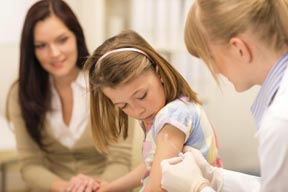As you finalize your child’s back to school checklist — new clothes, new schedule, school supplies — make sure you haven’t forgotten their immunizations. Failing to have your child vaccinated could mean the difference between life and death, says a University of Alabama at Birmingham pediatric infectious disease specialist.

Sixteen diseases can be prevented by childhood vaccines, according to the Centers for Disease Control and Prevention: chickenpox (varicella), diphtheria, flu (influenza), Haemophilus influenza type b (Hib), hepatitis A, hepatitis B, human papillomavirus (HPV), measles, meningococcal, mumps, pneumococcal, polio, rotavirus, rubella, tetanus and whooping cough (pertussis). In Alabama, the state board of health requires age-appropriate vaccinations for children prior to their entering grades K-12.
“These vaccines save children’s lives; parents interested in keeping their child alive should have them vaccinated,” says David Kimberlin, M.D., UAB professor of pediatrics and president-elect of the Pediatric Infectious Diseases Society.
“At any given time, all of these vaccine-preventable diseases are at most 18 hours away,” Kimberlin says. “For example, one of the few remaining places where polio circulates is Afghanistan, and U.S. troops return home from there daily; anyone exposed could inadvertently pass polio to a child.”
| “At any given time, all of these vaccine-preventable diseases are at most 18 hours away." |
During his residency in Dallas, Texas, Kimberlin saw first-hand the destruction that a disease like polio can cause; a 10-year-old girl came into the emergency department after developing paralysis. Kimberlin says the girl’s father wanted to know why it hadn’t been prevented — turns out, she was never vaccinated against polio.
Kimberlin says having your child vaccinated also can save your neighbor’s life. He points to a widespread pertussis outbreak in the state of Washington.
“School-age children don’t die from pertussis, but babies do. If an unvaccinated 12-year-old vacations in Washington and comes in contact with the disease, they can bring it home and inadvertently kill a baby under 12 months old,” he explains.
Clinical psychologist Vivian Friedman, Ph.D., professor in the UAB Department of Psychiatry and Behavioral Neurobiology, says while there is a population of parents who do not have their children vaccinated, it’s hard to give just one explanation for that kind of choice.
“People do have all sorts of fears of things they don’t understand, but there is no rational reason for not vaccinating a child,” she says.
And if it is not the parent that is the issue when it comes to getting these potentially life-saving shots, but instead is the child refusing, Friedman encourages the use of small incentives to help.
“My own daughter was seriously ill from the ages of 4 to 10; she not only had painful shots but also painful procedures. So for every bad thing that happened to her, we made a good thing happen,” Friedman says. “For every blood test my daughter got, we took her to the dollar store to choose anything she wanted. It’s inexpensive and varied enough that it can work as a motivator and reward.”